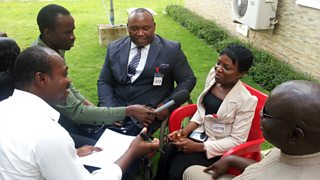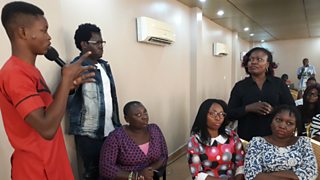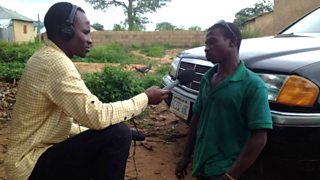To the polls: Radio changes the story for people with disabilities in Nigeria
Michael Ashofor
Producer, BBC Media Action Nigeria
Tagged with:
On World Radio Day, discover how we’re using radio in Nigeria to help people with disabilities get their voices heard in the country’s general elections.

Michael interviewing members of a disability rights group in Nigeria for Talk Your Own
“He (the driver) declined saying he didn’t want to take a wheelchair and I discovered that about five or six taxis were not going to take me… I waited for about two hours… it's the kind of thing that an average person with disability faces in our society”.
These are the words of Dr Toyin Aderemi, a disability activist and researcher who was left unable to walk after contracting polio in childhood. Toyin shared her personal experience of discrimination on our radio programme, Talk Your Own.
The World Health Organization estimates that there are 29 million people in Nigeria (15% of the population) living with a disability. Unfortunately, stories like Toyin’s are widespread – with abuse, exclusion, and discrimination a daily reality for people with disabilities in Nigeria. And sadly this goes for the electoral process too. Disabled people are often excluded from elections – both as voters and as candidates – to the point where many have become disenfranchised, resulting in little or no representation within government.

Barrister Catherine Edeh using a sign language interpreter at a BBC Media Action town hall debate
Dialogue, tolerance and peace
Our longstanding weekly radio show, Talk Your Own, airs on 160 radio stations across Nigeria and helps people – particularly from marginalised groups – to make their voices heard, draw attention to their rights, and become more involved in political processes. Our programmes regularly feature people with disabilities talking about their expectations of an inclusive voting process and holding leaders to account, which is particularly important in the lead-up to our general elections this weekend.
The show has helped me to realise how ignorant I have been in the past when it comes to inclusivity.
For instance in the run-up to Nigeria’s last general elections in 2015, I worked as an Assistant Producer facilitating the recording of our ‘town hall’ meetings for radio broadcast. My job was to walk the floor with a microphone so the audience could ask questions of local leaders and politicians. In these meetings, I would hear people murmuring about the demands made by disabled people, such as requests for brail ballot papers, magnifying glasses, and accessible polling booths. I would occasionally catch myself wondering why they were asking for things which seemed so impossible to achieve. But I’m glad to say our work has helped me to know better.

Ibrahim Adamu from Bwari, Abuja talking to Michael about the difficulties faced by PWDs
Changing minds, changing lives
Hearing more and more from people with disabilities has helped me and our millions of listeners across the country gain a deeper understanding of why these demands are so important. It’s been a privilege providing them with a platform from which to speak, and in many episodes of Talk Your Own they have been able to extract commitments from leaders and policy makers to which they can be held accountable.
The good news is that these demands are being heard and acted upon!
On 9th January, the electoral body in Nigeria released guidelines for the conduct of the 2019 elections, and in a breakthrough these guidelines include the provision of brail guides and magnifying glasses, as well as priority voting for people with disabilities. And the icing on the cake? On January 23rd the President signed a bill into law which prohibits discrimination against disabled people.
Both of these moments are just a small milestone in the bigger journey towards a completely inclusive Nigeria. But for me, as a member of the BBC Media Action Nigeria radio team, now more than ever it strengthens my resolve that making inclusive radio programmes will lead to a better society for all.
--
Michael Ashofor is a Producer for BBC Media Action Nigeria, based in Abuja.
Our weekly radio shows Talk Your Own and its sister show (in Hausa language) Mu Tattauna reach 19.7 million and 11 million people across Nigeria respectively, regularly featuring the voices and stories of people with disabilities.
For more information about our elections work in Nigeria, click here.
